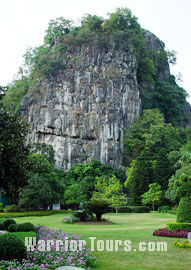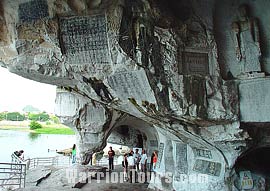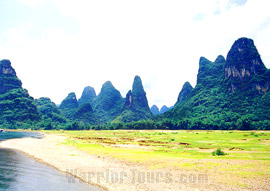Fubo Hill & Diecai Hill

![]() Fubo Hill
Fubo Hill
Situated on the western bank of Li River in the northern part of the city, Fubo Hill is actually an integrative garden park in the city center with a handsome hill, unique mountain caves and elegant garden rock formations.
Elegantly standing on the riverside, Fubo Hill (Wave-Subduing Hill) has its half standing in the river and the other half perching on land. The river waters are blocked by the hill and eddied, creating wavelets, hence the name - Subduing Wave Hill (literally means the waters has been subdued by the hill). Another legend says the hill got its name from a general, called Fubo who came to the place in a past dynasty.
A cloister cruising on the eastern hillside leads to the top of the hill, on the half-way of which stands a pavilion named Tingtao Pavilion, (Listen-to-the-Wave Pavilion). The hilltop offers a breathtaking view of the picturesque mountain and river scenery of the city.

At the eastern foot of the hill is a zigzagged water-eroded cave called Huan-Zhu Cave (Pearl-Retreating Cave), in which a variety of inscriptions of the well-known Chinese calligraphers and painters in the past dynasties can be found. Among them, the self-portrait and inscriptions of Mi Fu, one of the four greatest calligraphers in the Song Dynasty (960-1279) is the most precious one. There are also over 400 Buddhist carvings and statues of the Tang Dynasty (618-907) on the interior wall of the cave.
The eastern exit of the cave is a large opening over the river and there is a rock pillar hanging down from the cave with a larger upper body and a small lower tip. The tip almost reaches the ground with a gap only less than three centimeters (1.18 inches). Therefore, being looked afar, it seems like a sword plugging into the ground. It has a legend that a general named Fubo once tested his sword here and another interesting one goes that if the pillar touches the ground, there would be a Zhuang Yuan (the Number One Scholar, the very best in the imperial exam) who had got his success.
At the entrance gate of the park, there is a huge iron bell at the weight of over 2,500 kilograms and a big boiler, which is said to cook meals for over 1,000 people. These are two relics from a Qing Dynasty temple and the inscriptions on them are still discernible.
| Admission Fee: | CNY 11 |
| Opening Hours: | 07:10 to 18:30 |
| Recommended Time for a Visit: |
45 minutes |
| Bus Route: | 2, 15, 58 |
![]() Diecai Hill
Diecai Hill
Standing on the western bank of the famous Li River in the city center, the elegant Diecai Hill composed of four scenic peaks is one of the three renowned tourist attractions in the city of Guilin. (The other two are Fubo Hill and Solitary Beauty Hill.)

The sunlit stratified rocks on the hill resembling piles of brocades earn it the name Diecai (Folded Brocade Hill). The hill became well-known during the Tang Dynasty (618-907) 1,000 years ago. It was a place where poets and writers found and gathered their poetic inspiration amidst the enthralling surrounding scenery. Hundreds of poems inscribed on the hill’s cliffs from the past dynasties add extra charm to the site. Now a park has been built on the site with many features including the Diecai Pavilion (Folded Brocade Pavilion), Wind Cave, Wangjiang Pavilion (Looking-over-River Pavilion) and the Cloud-Catching Pavilion.
Diecai Pavilion offers a charming bird's-eye view of the surrounding scenery and to the west of it there is a range of unique garden architecture in the style of the Dong, an ethnic group. The 20-meter (66 feet) long Wind Cave at the mountainside of Mingyue Peak (Bright-Moon Peak) was originally used as an underground watercourse. The long cave penetrates through the peak resulting in a draught, hence the name.
The park is the best place to get a panoramic view of the city. The suggested visiting time is around one and a half hours.
| Admission Fee: | CNY 20 (half price for children between 3.6 - 4.6 feet tall; free for children below 3.6 feet tall) |
| Opening Hours: | 08:00 - 18:30 |
| Bus Route: | 58 (free), 2, 13 |

